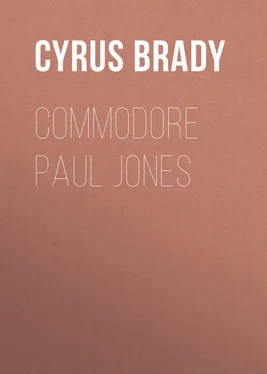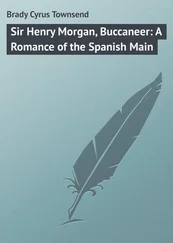Cyrus Brady - Commodore Paul Jones
Здесь есть возможность читать онлайн «Cyrus Brady - Commodore Paul Jones» — ознакомительный отрывок электронной книги совершенно бесплатно, а после прочтения отрывка купить полную версию. В некоторых случаях можно слушать аудио, скачать через торрент в формате fb2 и присутствует краткое содержание. Жанр: foreign_prose, на английском языке. Описание произведения, (предисловие) а так же отзывы посетителей доступны на портале библиотеки ЛибКат.
- Название:Commodore Paul Jones
- Автор:
- Жанр:
- Год:неизвестен
- ISBN:нет данных
- Рейтинг книги:5 / 5. Голосов: 1
-
Избранное:Добавить в избранное
- Отзывы:
-
Ваша оценка:
- 100
- 1
- 2
- 3
- 4
- 5
Commodore Paul Jones: краткое содержание, описание и аннотация
Предлагаем к чтению аннотацию, описание, краткое содержание или предисловие (зависит от того, что написал сам автор книги «Commodore Paul Jones»). Если вы не нашли необходимую информацию о книге — напишите в комментариях, мы постараемся отыскать её.
Commodore Paul Jones — читать онлайн ознакомительный отрывок
Ниже представлен текст книги, разбитый по страницам. Система сохранения места последней прочитанной страницы, позволяет с удобством читать онлайн бесплатно книгу «Commodore Paul Jones», без необходимости каждый раз заново искать на чём Вы остановились. Поставьте закладку, и сможете в любой момент перейти на страницу, на которой закончили чтение.
Интервал:
Закладка:
The ship duties in port not being arduous, the young apprentice, through the influence of his brother, was permitted to spend the period of the vessel's stay in America on shore under the roof of his kinsman. There he continued his studies with that zeal for knowledge which was one of his distinguishing characteristics, and which never left him in after life; for it is to be noted that he was always a student; indeed, had he not been so, his subsequent career would have been impossible. It was largely that habit of application, early acquired, that enabled him to advance himself beyond his original station. He especially applied himself to the science of navigation, the intricacies of which he speedily mastered, so that he became subsequently one of the most expert navigators that sailed the sea.
His natural inclination for the sea stood him in good stead, and he finally acquired a complete knowledge of the details of his trying profession. Upon the failure of Mr. Younger, who surrendered the indentures of young Paul to him as the only thing he could do for him in his present circumstances, he was sufficiently capable to receive an appointment as third mate on the slaver King George, of Whitehaven. A few years after, in 1766, being then but nineteen years of age, he was appointed to the most responsible position of chief mate of the slaver Two Friends, a brigantine of Jamaica. The contrast between the old and the new régime is brought vividly before us when we learn that to-day a cadet midshipman-the lowest naval rank at present-of the same age has still a year of schooling to undergo before he can even undertake the two years' probationary cruise at sea required before he can be commissioned in the lowest grade.
Slave trading was a popular and common vocation in that day, not reprehended as it would be at present. Gentlemen of substance and station did not scruple to engage in it, either as providing money and receiving profit, or as actually participating as master or supercargo of ships in the traffic. It is interesting to note that young Paul, as he grew in years and acquired character, became intensely dissatisfied with slaving. The sense of the cruelties, iniquities, and injustice of the trade developed in him with coming manhood, and gradually took such possession of him that, as was stated by his relatives and himself, he finally resolved to withdraw from it.
This determination, scarcely to be expected from one of his birth and circumstances, was greatly to his credit. The business itself was a most stirring and lucrative one, and for a young man to have attained the rank he enjoyed so early in life was evidence that he need have no fear but that the future would bring him further advancement and corresponding pecuniary reward. In this decision he was certainly in advance of his time as well; but that love of liberty which had been bred in him by the free air of the bold hills of his native land, and which afterward became the master passion of his life, for which he drew his sword, was undoubtedly heightened and intensified by this close personal touch with the horrors of involuntary servitude.
In the year 1768, therefore, giving up his position on the Two Friends, he sailed as a passenger in the brigantine John, bound for Kirkcudbright. It happened that the captain and mate of the vessel both died of fever during the voyage, and at the request of the crew Paul assumed command and brought the vessel safely to her port. Currie, Beck & Co., the owners of the John, were so pleased with this exploit that they appointed young Paul master and supercargo of the vessel, in which he made two voyages to the West Indies. He was a captain, therefore, and a merchant at the age of twenty-one. The owners of the John dissolved partnership on the completion of his second voyage, and disposed of the ship, giving Paul the following honorable certificate upon his discharge from their employ:
"These do certify to whom it may concern, that the bearer, Captain John Paul, was two voyages master of a vessel called the John, in our employ in the West India trade, during which time he approved himself every way qualified both as a navigator and supercargo; but as our present firm is dissolved, the vessel was sold, and of course he is out of our employ, all accounts between him and the owners being amicably adjusted. Certified at Kirkcudbright this 1st April, 1771.
"Currie, Beck & Co."One incident in his West Indian service is worthy of mention, because it afterward crept out in a very ugly manner. On the second voyage of the John the carpenter, a man named Mungo Maxwell, formerly of Kirkcudbright, who had been mutinous, was severely flogged by the order of Paul. Maxwell was discharged at the island of Tobago. He immediately caused Paul to be summoned before the judge of the vice-admiralty court for assault. The judge, after hearing the testimony and statement of Captain Paul, dismissed the complaint as frivolous. Maxwell subsequently entered on a Barcelona packet, and in a voyage of the latter ship from Tobago to Antigua died of a fever. Out of this was built up a calumny to the effect that Maxwell had been so badly punished by Paul that he died from his injuries. When Paul was in the Russian service years afterward the slander was enhanced by the statement that Maxwell was his nephew. There was nothing whatever in the charge.
After his retirement from the command of the John he engaged in local trading with the Isle of Man. It has been charged that he was a smuggler during this period; but he specifically and vehemently denied the allegation, and it is certain that the first entry of goods shipped from England to the Isle of Man, after it was annexed to the crown, stands in his name on the custom-house books of the town of Douglas. Soon after this he commanded a ship, the Betsy, of London, in the West India trade, in which he engaged in mercantile speculations on his own account at Tobago and Grenada, until the year 1773, when he went to Virginia again to take charge of the affairs of his brother William, who had died intestate, leaving neither wife nor children.
Very little is known of his life from this period until his entry into the public service of the United States. From remarks in his journal and correspondence, it is evident, in spite of his brother's property, to which he was heir, and some other property and money which he had amassed by trading, which was invested in the island of Tobago, West Indies, that he continued for some time in very straitened circumstances. He speaks of having lived for nearly two years on the small sum of fifty pounds. It is probable that his poverty was due to his inability to realize upon his brother's estate, and the difficulty of getting a return of his West Indian investments, on account of the unsettled political conditions, though they were of considerable value. During this period, however, he took that step which has been a puzzle to so many of his biographers, and which he never explained in any of his correspondence that remains. He came to America under the name of John Paul; he reappeared after this period of obscurity under the name of John Paul Jones.
It is claimed by the descendants of the Jones family of North Carolina that while in Fredericksburg the young mariner made the acquaintance of the celebrated Willie (pronounced Wylie) Jones, one of the leading attorneys and politicians of North Carolina. Jones and his brother Allen were people of great prominence and influence in that province. It was Jones' influence, by the way, which in later years postponed the ratification of the proposed Constitution of the United States by North Carolina. Willie Jones seems to have attended to the legal side of Paul's claims to his deceased brother's estate, and a warm friendship sprang up between the two young men, so dissimilar in birth and breeding, which, it is alleged, ended in an invitation to young Paul to visit Jones and his brother on their plantations.
Читать дальшеИнтервал:
Закладка:
Похожие книги на «Commodore Paul Jones»
Представляем Вашему вниманию похожие книги на «Commodore Paul Jones» списком для выбора. Мы отобрали схожую по названию и смыслу литературу в надежде предоставить читателям больше вариантов отыскать новые, интересные, ещё непрочитанные произведения.
Обсуждение, отзывы о книге «Commodore Paul Jones» и просто собственные мнения читателей. Оставьте ваши комментарии, напишите, что Вы думаете о произведении, его смысле или главных героях. Укажите что конкретно понравилось, а что нет, и почему Вы так считаете.












